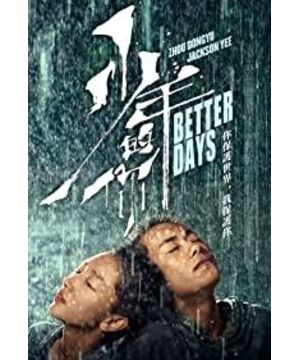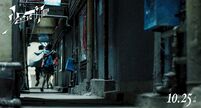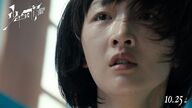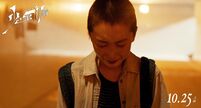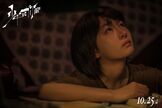Three years ago, no one thought that a female-themed film made by a male Hong Kong director would become a dark horse at the box office and successfully win two young golden horse actresses; similarly, no one expected that the second star would become a dark horse at the box office. The acting director's new work this year can boldly shoot a story of campus bullying that mainland movies have not dared to face, and has an amazing record of 200 million box office on the film's premiere day! Director Zeng Guoxiang's new film can be described as ill-fated. As early as this year, he announced that he was shortlisted for the new generation unit of the Berlin Film Festival and will hold a world premiere during the film festival. However, it was unexpectedly announced a few days before the premiere due to technical reasons. The screening was cancelled, and the one who enjoyed the same "treatment" was "One Second" directed by Zhang Yimou. This not only disappointed Chinese and foreign journalists and movie fans who traveled to Berlin in high spirits, but also drew international attention to the issue of film censorship in mainland China. After that, the film was announced to be released at the end of June in the summer program, but it was again unlucky to be withdrawn. Just when the public was hopeless about the film's release, it was announced on Monday that it was scheduled to be released. At that time, there were only three days left before the premiere. Following the well-received "July and An Sheng", Zeng Guoxiang once again chose to shoot the theme of youth growth, which is an excellent choice for the new director, and this time integrates the college entrance examination, family, class, school bullying and juvenile delinquency. Such topics close to reality add a lot of social critical significance to the film. Among them, the most eye-catching topic is campus bullying. The bold and frank depiction of violence is different from the performance of similar themes in mainland films. The camera no longer flinches to avoid school violence, from the girl jumping off the building to commit suicide at the beginning, to the heroine being abused and beaten on the way from school, and then to the horrific scenes of abuse such as being torn from her clothes and taking nude photos and hair cutting. The heroine's preparation for the college entrance examination runs through the whole story, with an obvious critical irony: for students from different classes, this exam is the only way out in life, and the cruelty is no less than the bullying and abuse the heroine encounters. It is not only the controversial topic that grabs the attention, but also the explosive acting skills of the two protagonists. The director used a lot of close-up shots this time, allowing the audience to focus on observing the actor's facial expressions and quickly enter the character's inner world. This kind of shooting method naturally has extremely high requirements on the actors. Zhou Dongyu, who is working together for the second time, still lives up to expectations. The makeup that sacrifices the image, the complex and delicate expressions, and the powerful way of crying are full of praise, and is expected to appear in the movie again. The back throne; and the new-generation actor Yi Yangqianxi, who is the male lead for the first time, is even more impressive, using the most natural expressions and appearances to deduce characters with complex personalities. Zeng Guoxiang is quite confident in this script, which is reflected in the smooth and skillful performance of genre films. from The campus bullying in the first half turns into a romantic love genre, and then mutates into a criminal suspense pattern. The constantly reversing design in the second half is similar to the previous work "July and An Sheng", which seems to once again confirm that second-rate novels are the most suitable Adapting first-class screenplays. The appeal and expressiveness of the hand-held photography style to the subject is remarkable. The slightly shaking picture seems to make people feel the breathing and pulse of the characters, especially when shooting the paragraphs where the two have mutual affection, I can smell Wong Kar Wai's label style. For example, the scene where the hero follows the heroine riding the escalator is very similar to the interaction between Faye Wong and Tony Leung in "Chongqing Forest". The scene where the heroine is chased by three female classmates at home is more of a crime thriller. The editing of the chase scene creates a dramatic atmosphere of fear, and the plot after hiding in the trash is even more frightening. I don't have much experience with school bullying. Maybe I was lucky enough not to have encountered the cruel experience in the film, but I was unexpectedly deeply shocked by the love tragedy between the two. The hero sacrifices his future to become the heroine, but he turns a blind eye to the crimes committed by the heroine; the heroine has the heart to destroy the future of her lover in order to achieve the purpose of going to college. This kind of love (or strange love) that transcends normal social moral concepts unexpectedly finds the most reasonable interpretation angle in this theme of youth growth. The most exciting tear-jerking moments in the whole play are the two scenes of the police station interrogation and the prison visit. In the interrogation scene, the white light from the top of the actor's head creates an atmosphere of repentance in the church, implying that the two face the time of conscience trial; and in the scene where the heroine comes to prison to visit the hero, the two do not have a dialogue, but through it. The overlapping faces of the two on the glass mirror to show the turbulent inner feelings of the two are also the most tear-jerking moment in the whole film. The common techniques in such European art films make people regain the moving charm brought by the language of images, and through this film, Zeng Guoxiang has accumulated and consolidated a richer and more unified narrative style, which seems to be intentionally moving in the direction of the author and director Go ahead and be pleasantly surprised. The paragraphs are more in the style of crime thrillers, the editing of the chase scenes creates a dramatic atmosphere of fear, and the plot after hiding in the trash can is even more frightening. I don't have much experience with school bullying. Maybe I'm lucky enough not to encounter the cruel experience in the film, but I was unexpectedly deeply shocked by the love tragedy between the two. The hero sacrifices his future to become the heroine, but he turns a blind eye to the crimes committed by the heroine; the heroine has the heart to destroy the future of her lover in order to achieve the purpose of going to college. This kind of love (or strange love) that transcends normal social moral concepts unexpectedly finds the most reasonable interpretation angle in this theme of youth growth. The most exciting tear-jerking moments in the whole play are the two scenes of the police station interrogation and the prison visit. In the interrogation scene, the white light from the top of the actor's head creates an atmosphere of repentance in the church, implying that the two face the time of conscience trial; and in the scene where the heroine comes to prison to visit the hero, the two do not have a dialogue, but through it. The overlapping faces of the two on the glass mirror show the turbulent feelings of the two, which is also the most tear-jerking moment in the whole film. The common techniques in such European art films make people regain the moving charm brought by the language of images, and through this film, Zeng Guoxiang has accumulated and consolidated a richer and more unified narrative style, which seems to be intentionally moving in the direction of the author and director Go ahead and be pleasantly surprised. The paragraphs are more in the style of crime thrillers, the editing of the chase scenes creates a dramatic atmosphere of fear, and the plot after hiding in the trash can is even more frightening. I don't have much experience with school bullying. Maybe I'm lucky enough not to encounter the cruel experience in the film, but I was unexpectedly deeply shocked by the love tragedy between the two. The hero sacrifices his future to become the heroine, but he turns a blind eye to the crimes committed by the heroine; the heroine has the heart to destroy the future of her lover in order to achieve the purpose of going to college. This kind of love (or strange love) that transcends normal social moral concepts unexpectedly finds the most reasonable interpretation angle in this theme of youth growth. The most exciting tear-jerking moments in the whole play are the two scenes of the police station interrogation and the prison visit. In the interrogation scene, the white light from the top of the actor's head creates an atmosphere of repentance in the church, implying that the two face the time of conscience trial; and in the scene where the heroine comes to prison to visit the hero, the two do not have a dialogue, but through it. The overlapping faces of the two on the glass mirror show the turbulent feelings of the two, which is also the most tear-jerking moment in the whole film. The common techniques in such European art films make people regain the moving charm brought by the language of images, and through this film, Zeng Guoxiang has accumulated and consolidated a richer and more unified narrative style, which seems to be intentionally moving in the direction of the author and director Go ahead and be pleasantly surprised.
View more about Better Days reviews


